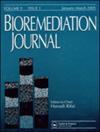叶面微菌对盐碱地青花植物促生长特性及除砷效果的评价
IF 1.9
4区 环境科学与生态学
Q3 ENVIRONMENTAL SCIENCES
引用次数: 3
摘要
摘要小叶微生物以其产生铁载体的能力而闻名,铁载体与植物根系协同作用,可有效影响砷酸盐向亚砷酸盐的迁移率、砷的吸收和转运。本研究调查了植物生长促进细菌对黄曲霉从污染土壤中吸收砷的影响。目前的研究证明了M.foliorum植物修复对马拉地霉植物的砷耐受性、去除和毒性的有效性。观察期为90 天,在砷污染的土壤中用M.foliorum处理生长中的植物。评价了对开枝霉的形态特征、土壤pH值和潜在优势。植物没有表现出任何明显的毒性迹象,然而,在对开M.foliorum的存在下,根和茎的长度显著增加。无论PGPB存在与否,接种对开M.foliorum的植物中的生物富集因子(BCF)增加了0.3倍,而接种对开M.Malabatricum的植物的As转移因子(TF)降低。与其他两种(A2和对照)植物修复处理相比,对foliorum的As植物修复处理也提高了根部(26%)和地上部(22%)对As的吸收。这表明,接种对开分枝杆菌通过显著减少不利胁迫影响、增加茎和根的鲜重和干重来降低砷的毒性。本文章由计算机程序翻译,如有差异,请以英文原文为准。
Assessment of plant growth promotion properties and impact of Microbacterium foliorum for arsenic removal in Melastoma malabathricum
Abstract The Microbacterium foliorum species is known for its ability to produce siderophores which, in synergy with the plant root, can effectively affect the rates of arsenate-to-arsenite mobilization, arsenic uptake, and translocation. This study investigates M. foliorum, a plant growth-promoting bacterium (PGPB), in the absorption of arsenic (As) by Melastoma malabathricum plant from contaminated soil. The current study demonstrates M. foliorum phytoremediation’s efficacy in terms of As tolerance, removal, and toxicity in the M. malabathricum plant. For an observation period of 90 days, growing plants were treated with M. foliorum in arsenic-contaminated soil. The morphological trait, pH of soil, and potential advantage induced by M. foliorum on M. malabathricum were evaluated. Plants did not display any noticeable signs of toxicity, however, the root and stem length were significantly increased in the presence of M. foliorum. The Bioconcentration Factor (BCF) was increased in plants inoculated with M. foliorum by 0.3 times, the Transfer Factor (TF) of As in the M. malabathricum plants decreased, whether in the presence or absence of PGPB. The As phytoremediation treatment with M. foliorum also enhanced uptake of As in root (by 26%) and shoot (by 22%) than in the other two (A2 and control) phytoremediation treatments. This shows that M. foliorum inoculation reduced As toxicity through substantial reduction of the adverse stress effects, increased stem and root fresh and dry weight.
求助全文
通过发布文献求助,成功后即可免费获取论文全文。
去求助
来源期刊

Bioremediation Journal
ENVIRONMENTAL SCIENCES-
CiteScore
5.30
自引率
0.00%
发文量
36
审稿时长
9 months
期刊介绍:
Bioremediation Journal is a peer-reviewed quarterly that publishes current, original laboratory and field research in bioremediation, the use of biological and supporting physical treatments to treat contaminated soil and groundwater. The journal rapidly disseminates new information on emerging and maturing bioremediation technologies and integrates scientific research and engineering practices. The authors, editors, and readers are scientists, field engineers, site remediation managers, and regulatory experts from the academic, industrial, and government sectors worldwide.
High-quality, original articles make up the primary content. Other contributions are technical notes, short communications, and occasional invited review articles.
 求助内容:
求助内容: 应助结果提醒方式:
应助结果提醒方式:


